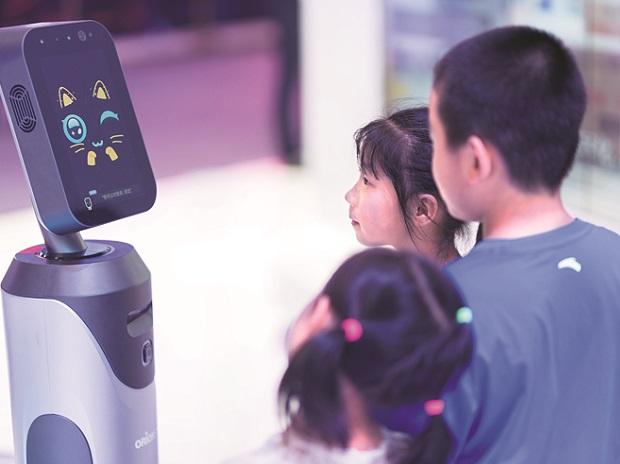China surpassing US in key innovation metric and evolving from ‘imitator’, Washington report says
- Global market share of American firms and its allies at risk ‘in most high-value-added, advanced industries’ vital to national prosperity and security
- Think tank study finds China’s innovation in 2020 was 139 per cent of its US equivalent, up from 78 per cent in 2010
Published: 6:50am, 24 Jan, 2023
A robot makes coffee at a hi-tech fair in Shenzhen, China. The report by the Information Technology and Innovation Foundation looked at 22 innovation-related indicators. Photo: Xinhua
China has often been dismissed by industrialised nations as a country that is adept at copying but weak at creating, crippled by a memorisation-based education system, excessive respect for authority and a tendency to steal intellectual property. But a study released on Monday finds that China has surpassed the US in one key measure of innovation and is making major strides in another.
The report by the Information Technology and Innovation Foundation, a non-partisan Washington-based think tank focused on US science and technology policy, found that China’s innovation in 2020 was 139 per cent of its US equivalent, up from 78 per cent in 2010.
And based on another metric accounting for the comparative size of their economies and populations, China’s innovation output was three-quarters of US levels, up from 58 per cent in 2010.
“China is evolving from an imitator to an innovator, following a path blazed by its Asian Tiger neighbours – but at a much larger scale, with far greater geopolitical consequences,” said Robert Atkinson, the foundation’s president, who co-authored the report along with research assistant Ian Clay.
China has already displayed great potential for global leadership in several key areas, including supercomputers, space exploration,
artificial intelligence,
quantum computing and
high-speed rail.
“Its innovation capabilities now threaten the global market share of firms from the
United States and allied nations in most high-value-added, advanced industries that are important to US prosperity and security,” Atkinson added.
History abounds with developing countries hitting a roadblock, sometimes dubbed the “middle-income trap”, in their bid to join the world’s wealthiest and most technologically advanced economies.
If China with its vast size and population can join that elite club, it would upend global geopolitics, supply chains and power balances for decades, according to the report, titled “Wake Up, America: China Is Overtaking the United States in Innovation Capacity”.
The cost for the US or other advanced nations that lose their hi-tech competitive edge is significantly more consequential than losing ground in low-skill industries given the loss of good-paying jobs, the national security risks and how difficult it is to regain ground after falling behind. Making a single dynamic random access memory
semiconductor, for instance, entails more than 1,000 steps.
China accelerated its innovation push under President
Xi Jinping, crystallised with the 2015 release of its “Made in China 2025” report. While a blueprint for national advancement is laudable, the foundation said, China’s protectionist and “filching” policies, forced technology transfers, import barriers and subsidised national champion and state-owned companies were less so.
However, the analysis focuses on the 2010-2020 period and does not reflect programmes, funding and initiatives put in place by the administration of President
Joe Biden, including the
Chips and Science Act, the
Inflation Reduction Act, and the
Infrastructure Investment and Jobs Act.
“We have already targeted spending on boosting education and workforce, things that China has been spending on that led to these trends,” said Kellee Wicker, director of the Wilson Centre’s science and technology innovation programme. “So I wouldn’t pick up sticks and move to a different country just yet.”
“They’re saying they’re kind of eating our lunch,” Wicker added of the report. “But that’s only a current trend, and we’re in the middle of taking a brand new tack toward really boosting the stuff they’re talking about.”
Another challenge involving China, analysts said, is that its politics often drive tech policy, and Beijing can be adept at hiding weaknesses and avoiding transparency. This makes it difficult to assess how far ahead or behind the US is in various key areas relative to China. In addition,
high youth unemployment rates and
Covid-related disruptions have jolted Chinese companies and universities, as they have in the US.
“The US also needs to prioritise thinking through its own technology policies, both from an investment standpoint at home and making sure that we do stay ahead,” said Alexandra Seymour, a technology and national security analyst at the Centre for a New American Security and former Defence Department official.
“I don’t think we’ve suffered from complacency, but we have had an awakening that this is something we need to prioritise.”
Western leaders and technology experts have a long history of underestimating China. Kings College London professor Kerry Brown wrote in The Diplomat in 2014 that Beijing could pour all the money it wanted into R&D parks and churn out legions of engineers, but would stumble in creating globally innovative companies. “The system that China currently has still rewards conformity,” he wrote.
And former Hewlett Packard CEO Carly Fiorina said: “Although the Chinese are a gifted people, innovation and entrepreneurship are not their strong suits. Their society, as well as their education system, is too homogenised and controlled to encourage imagination and risk-taking.”
Measuring innovation is an inexact science, and China – like
Japan and
Taiwan before it – has been accused of filing massive numbers of patents for bragging rights and to make it more difficult for foreign competitors to develop or implement their own inventions, utility models or designs.
The foundation examined 22 innovation-related indicators between 2010 and 2020, including
venture capital, patents and the amount of value added in advanced industries. It concluded China was making significant gains by almost every indicator.
China’s strongest inroads came in the number and quality of science and engineering articles, the number of patents worldwide related to a particular innovation – known as an international patent family – and the fees it received for its patents and other advances.
By 2020, China tallied more international patent families than the US and published more scientific articles in all fields surveyed, other than in geology, atmospheric and oceanic sciences.
China accounted for 39.6 per cent of the 1.7 million patents granted globally in 2021, the
World Economic Forum reported in December, followed by North America with 19.9 per cent and Europe with 11.8 per cent.
But the picture is mixed. China’s research was less influential than American research in every field other than mathematics and statistics, the report said. It has also been weaker than the US in translating innovation to high R&D industries and hi-tech exports.
The report further identified several social trends creating headwinds for China, such as its middle-income status, rapidly ageing population and declining economic productivity.
“I’m still not sold that we’re in these dire straits,” said Wicker, referring to the situation facing the US. “But I do think that, even if we’re not in these dire straits yet, the trends are clear. We should take it seriously.”
Global market share of America’s firms and its allies at risk ‘in most high-value-added, advanced industries’ vital to prosperity and security.

www.scmp.com


www.business-standard.com





